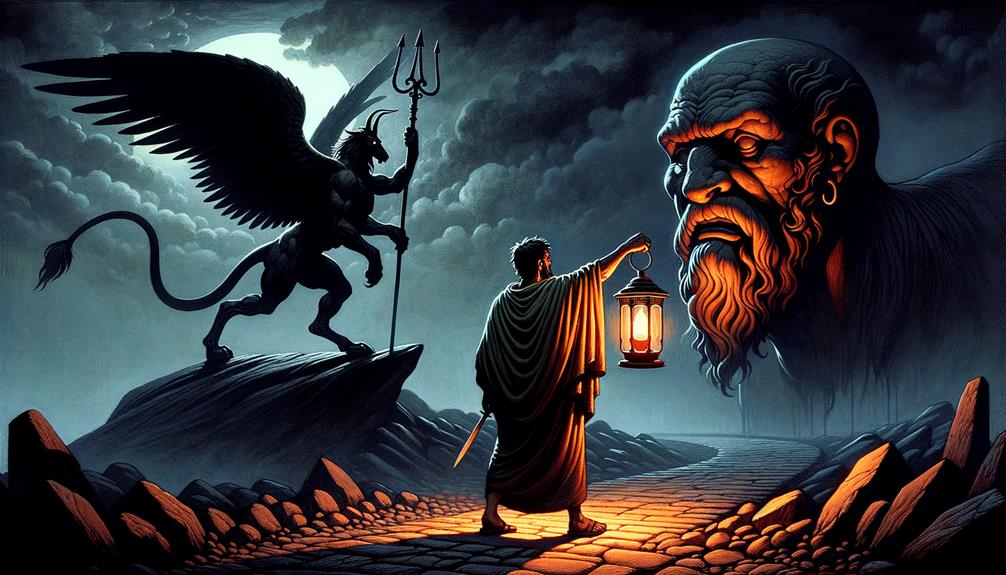Trying to understand Oedipus' journey, I've come across a story filled with ominous prophecies and a relentless quest for the truth. I dove into the narrative, fascinated by its rich symbolism. On looking closely, I realized that Oedipus lived under a cloud of inevitable tragedy, with his destiny etched by a powerful cosmic force. The struggle between his free will and his destined fate was quite clear, and the effects of his deeds resonated throughout his world, bringing to life harsh prophecies and igniting calamity. Oedipus' act of self-blinding, a striking symbol of guilt and repentance, signifies his tragic downfall. But remember, this is only scratching the surface of the complex narrative—there's much more to unravel in this tale.
The Prophetic Curse on Oedipus
The Delphic Oracle's prophecy laid a heavy burden on Oedipus, predicting a grim fate that he would kill his father and marry his mother. This tragic future seemed unavoidable, setting the stage for a journey filled with dread and despair. From birth, Oedipus was marked by this chilling prophecy, his life shadowed by the specter of an impending catastrophe. His parents, in a desperate bid to defy the Oracle's words, abandoned him, hoping to change the course of his destiny. But destiny is not easily swayed. His adoption and subsequent adventures were just pieces of a much larger puzzle, sketched out by fate's unyielding hand. Despite his attempts to sidestep this tragic destiny, each step only brought him closer to the inevitable truth. A truth, as it turns out, that he wasn't prepared to confront, but one that he was destined to endure.
Oedipuss Pursuit of Truth

Oedipus, with his dreaded destiny etched in stone, isn't the sort to sit back and watch his fate unfold. Instead, he embarks on a tireless search for answers, spurred on by the plague that's wreaking havoc in Thebes. This constant hunt for the truth is showcased in three key ways:
- He's hell-bent on unearthing King Laius's killer – a mission sparked by his city's anguish.
- He seeks counsel with Tiresias, the blind seer, even though Tiresias is hesitant to spill the disturbing truth.
- He pays no heed to warnings and signs, which, in the end, have disastrous outcomes.
In the play by Sophocles, Oedipus's truth-seeking journey symbolizes his character's tenacity, even when confronted with a fate as unyielding as Thebes's stone fortifications.
Tragic Ignorance and Realization

Oedipus's story is a deeply moving one, filled with lessons and warnings. He's a man who doesn't know who he truly is, and that's the root of his problems. What makes it even more poignant is that he's actively trying to figure it out, but his stubbornness and his refusal to accept harsh realities work against him. This is what we mean when we talk about his tragic ignorance.
Let's break it down a bit. First, we have Oedipus not knowing his real identity. Then there's his refusal to accept the prophecy, persistently doubting its truth. And of course, there's the dramatic irony. The audience is privy to information that Oedipus himself doesn't have – they know his identity and his fate. Our hero denies his destiny and his part in Laius's death, and refuses to acknowledge his own guilt. All the while, the audience can see his mistakes and missteps clearly. It's this dramatic irony that makes his story so captivating.
Ultimately, Oedipus realizes his destiny. It's a destiny he was oblivious to, born out of his tragic ignorance. It's a hard-hitting irony that marks the end of his tragic journey. This realization doesn't save him, rather it cements his downfall. It's an age-old tale that serves as a reminder of the dangers of ignorance and denial.
Role of Fate and Free Will

The story of Oedipus is a riveting one, full of intense clashes between fate and free will. These two forces mesh together, sculpting his future in a way that's both inescapable and heart-wrenching. Let's break down his story into three key parts:
- The Oracle of Apollo foretold a grim future for Oedipus. He was destined to commit acts that would shake anyone to the core – taking his father, King Laius's life, and wedded to his mother, Queen Jocasta.
- Oedipus wasn't about to take this laying down. He put his faith in his ability to change his future and made a swift exit from home to avoid this horrific fate.
- But, the harder he tried to sidestep his destiny, the closer he found himself to his tragic end.
The story of Oedipus is a classic example of the age-old fate versus free will debate. Despite his best efforts, destiny still had the final word, emphasizing the unfortunate inescapability of his fate.
Consequences of Oedipuss Actions

As we delve into Oedipus's story, we see how his choices created a ripple effect of disaster. The poor fellow killed King Laius and married his own mother, Queen Jocasta, without realizing the repercussions. Each choice he made, unbeknownst to him, was another footstep on his path to ruin. Despite his attempts to outsmart fate and the prophecy that foretold his downfall, Oedipus inadvertently fulfilled his destiny.
Let's break it down:
When Oedipus killed Laius, he made the prophecy come true. This act shows his rebellious nature, trying to escape his fate. Then, he married Jocasta. This union led to the birth of their cursed children, emphasising the notion of unescapable destiny. Finally, his self-blinding act was a physical sign of his ignorance, symbolizing his punishment and atonement.
What's chilling is that Oedipus's choices didn't just affect him. They were the spark that ignited Thebes' suffering. It's a stark reminder that our actions can have far-reaching impacts on those around us.
Frequently Asked Questions
What Was Oedipus Journey?
Let's chat about Oedipus' dramatic journey to find out who he really is. He was determined to learn about his true origins and fate, even though he was told it wouldn't end well. His path is a classic tale of denial and shocking revelations that, unfortunately, ends in disaster because he couldn't face the truth.
Does Oedipus Have a Hero's Journey?
Absolutely, Oedipus's life story can be likened to a hero's journey. It's chock-full of challenging situations that really push his limits. Oedipus's relentless pursuit of the truth, even though it ends in tragedy, is a testament to his bravery and tenacity, which are hallmarks of a true hero.
What Was the Journey of Oedipus When He Left Corinth?
After leaving Corinth, Oedipus had quite an eventful journey. He came across the Sphinx and, displaying his wit, he was able to solve its challenging riddle. This act freed the city of Thebes from its ongoing nightmare. But the drama didn't end there. Oedipus, without any knowledge of his real lineage, ended up marrying his own mother, Queen Jocasta. This unfortunate turn of events was actually a fulfilment of a prophecy that had been foretold at the time of his birth, setting in motion a chain of tragic incidents.
How Does Oedipus Run From His Fate?
So, it's me, Oedipus. In a wild bid to outrun my own fate, I packed my bags and left Corinth. I figured putting some miles between me and my destiny could maybe change things. But, wouldn't you know it? That trip I took, thinking I was clever, actually landed me smack dab in the middle of the very prophecy I was trying to dodge. How's that for irony?


